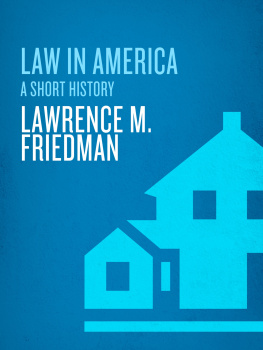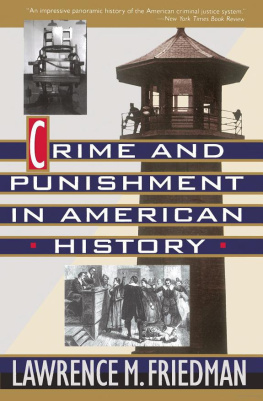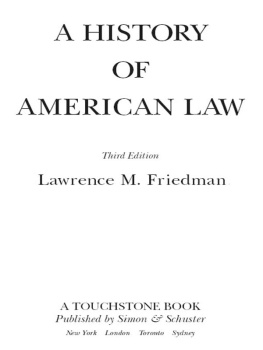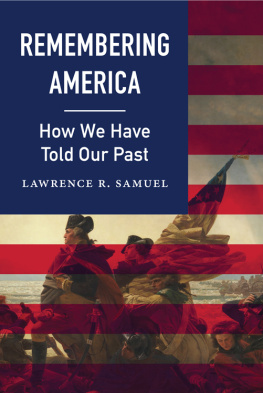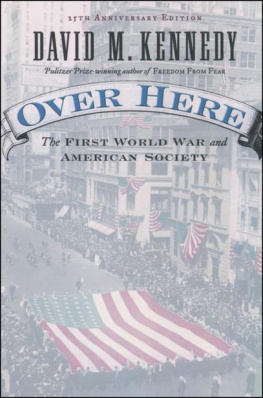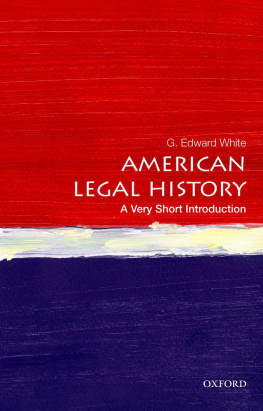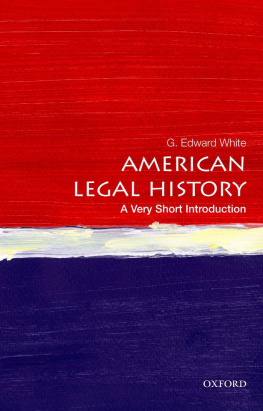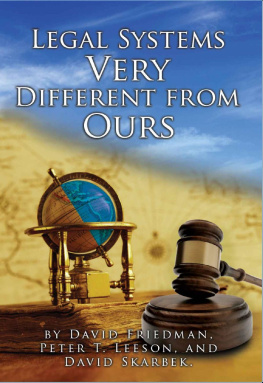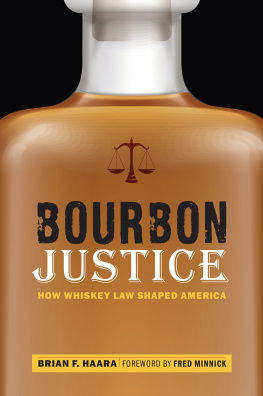Contents
Landmarks
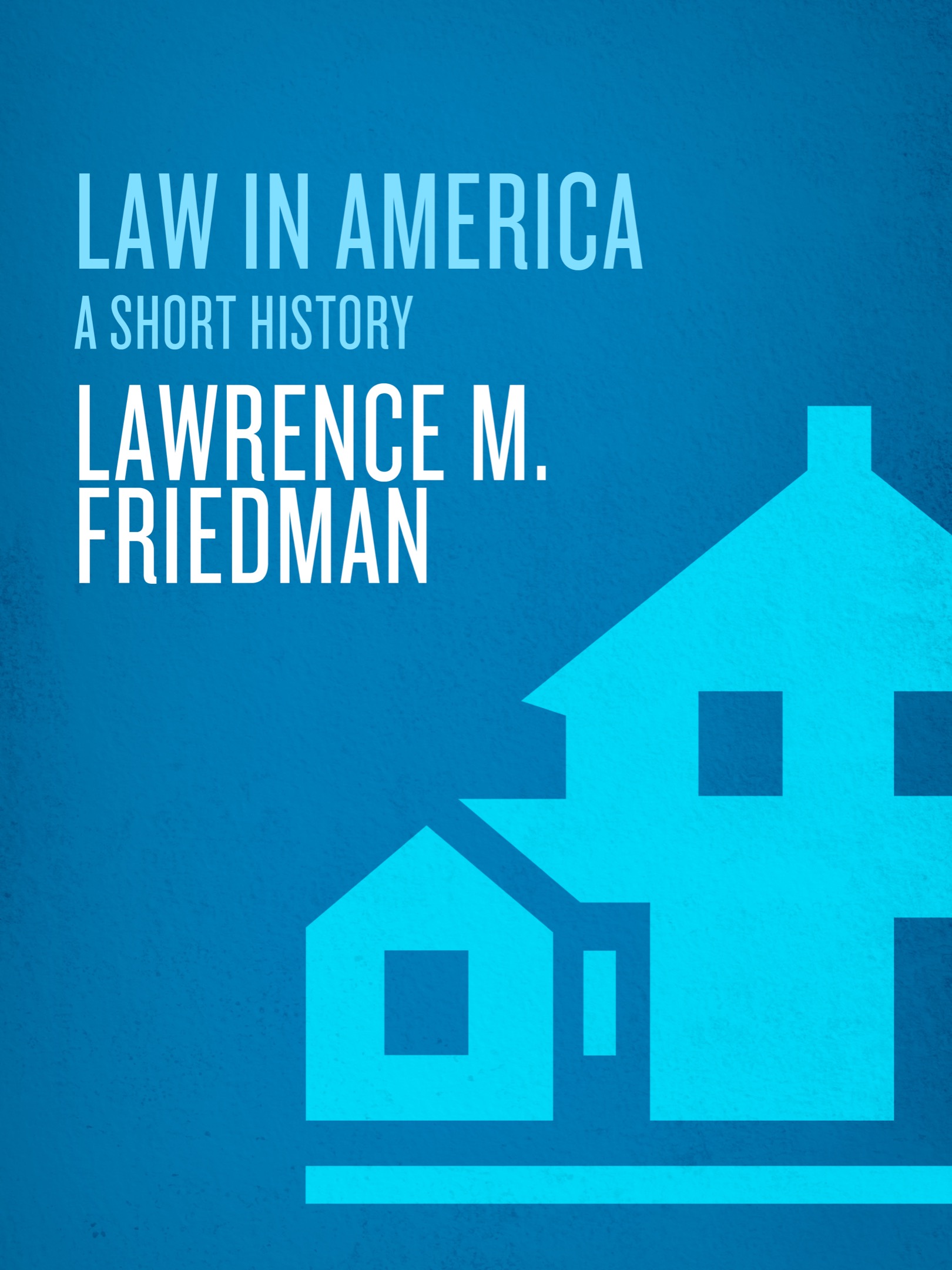
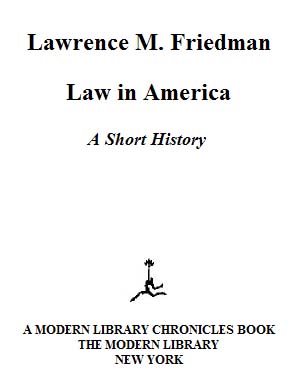
CONTENTS
To Leah, Jane, Amy, Sarah, Paul, David, and Lucy
ACKNOWLEDGMENTS
Many people have helped me in my work over the yearsstudents, colleagues, familyand their influence and support can be felt on every page, even if they did not literally contribute to the writing of this book. I do want to acknowledge the wonderful help I have always gotten, on this and every other project, from my assistant, Mary Tye, and from the Stanford Law Library, in particular Paul Lomio, Erika Wayne, and David Bridgman, three members of its marvelous staff.
ONE
INTRODUCTION
At my university (Stanford) I teach a course to undergraduates called Introduction to American Law. On my way to class, on the first daythe class usually meets at nine oclock, and it is a tough assignment to keep the students awakeI buy a copy of the Chronicle, the morning newspaper from San Francisco. When I begin the class, after the first few announcements and the like, I wave the paper in front of the class, and read some of the headlines. The point I want to get across to the students is that every domestic story in the front part of the newspaper, before you get to the recipes and the comics and the sports pages, has a legal anglehas some connection with the legal system. Of course, I have no control over the newspaper, but the trick never fails. Almost invariably, every story about public life in the United States, or private life interesting enough to get into the newspaper, will mention a law, a legal proposal, a bill in Congress or in the state legislature, or something a judge, a policeman, a court, a lawyer has done or said; or some statement from the president or other high officials, in any case always about some affair or situation or event done by, with, through, or against the law. In the world we live inthe country we live inalmost nothing has more impact on our lives, nothing is more entangled with our everyday existence, than that something we call the law. This is a startling fact; and it gets the students attentionas it should.
Why is it the case that the newspapers are so full of material about the legal system? What makes law so central to American society? Where does all this law come from? Is all of this emphasis on law and legal matters good for the country, or is it a sign of some deep-seated pathology? What is American law, and how did it get this way? These questions are the subject of this short book. What I am trying to do is provide a historical introduction to American lawor, perhaps more accurate, to American legal culture; or, perhaps, to the spirit of American law, and how it has related, over time, to American society in general.
Before we go any further, I have to say a word or two about the definition of law. There are, in fact, many ways to define this elusive term, and many ways to describe what we mean by law. For now, I want to adopt a simple, but broad and workable definition. Law is, above all, collective action: action through and by a government. When I say the law, I really mean the legal system. The legal system includes, first of all, a body of rulesthe laws themselves. Some of these are federal laws, enacted by Congress, some come from state legislatures, some are ordinances of city governments. Then there are literally tens of thousands of rules and regulationsfrom the Food and Drug Administration or the Securities and Exchange Commission or the Forest Service or the board that licenses doctors in Minnesota, or from local zoning boards or school boards or any of the dozens and dozens of agencies at every level of government. But all these, in themselves, are nothing but pieces of paper. What makes them come alive (when they do) are the people and the institutions that produce, interpret, and enforce them. This means police, jails, wardens, courts, judges, postal workers, FBI agents, the secretary of the treasury; it means civil servants who work for all the agencies in Washington, in the state capitals, and in city hall; and the inspectors who go out to factories and businesses, or who make sure that elevators are safe, or who put their stamp of approval on slabs of meat. It also means the lawyers (nearly a million of them) who advise people on how to follow the rules or cope with the rules or get around the rules, or how to use them to their best advantage. The lawyers are a vital part of the system, just as teachers are essential to the educational system, and doctors and nurses are essential to the medical system. And the legal system is the way all of these people and institutions interact with one another, and with the general public.
What I outlined is, I think, a useful way to look at the law or the legal system. There are other ways as well. I spoke generally in terms of something readers could identify as government; what the government did or does, and how people use or react to governmentbroadly defined that is, so that the policeman at a busy intersection, straightening out traffic, is part of the system, just as much as the chief justice of the United States is part of the system. There are even broader ways of defining law. It can be looked at as a kind of process, which does not have to be connected with a government at all. Universities, factories, hospitals, big companiesthese also often have a kind of legal system, quite internal, quite private. Law can, in other words, be official or unofficial; governmental or private. It can also be formal or informal. A big trial is a very formal procedure. It is governed by a network of formal rules. When a policeman breaks up a fight and tells two drunks to go home, this is a legal actionan action by an official, whose power comes from lawbut it is also fairly informal. It follows no strict rules, and leaves no paper trail behind. All societies, in a sense, have a legal system. They all have rules and ways to enforce the rules. Big, complex societies have big, complex systems. Within big, complex societies are smaller subgroups, down to individual families; and even families have ways to make rules and enforce them (sometimes, if the children are teenagers, without much success). The law inside a family is usually not written down, and procedures are pretty informal.
But the big society needs formality; it cannot go on without formalitywithout rules, especially rules of law. This is because a big society is made up of millions of people, who interact with each other in complicated ways. Strangers meet and affect other strangers many times each day: on the street, in elevators, airplanes, stores, and workplaces. In many ways, our very lives are in the hands of strangers. Consider, for example, taking a plane from San Francisco to Chicago. A jet airplane is an awesome machine. It flies high above the clouds; and if something goes wrong, your life is at stake. What guarantee do you have that the plane was well put together? That the maintenance is up-to-date? How do we know that the pilot knows what he is doing? How can we be sure that the air controllers will do their job? We have no personal knowledge or control over any of these peoplenot the pilot, not the air controllers, not the maintenance crew, or the factory workers who worked on the plane. For this, and a hundred other daily events, people have to rely on something else. That something else is the law. There is a social demand for rules and regulations about air safety, the way planes are made, air traffic control, and so on. Of course, a society can function without such rulespeople can take chances, if they wish. But in the modern state, the social demand for

